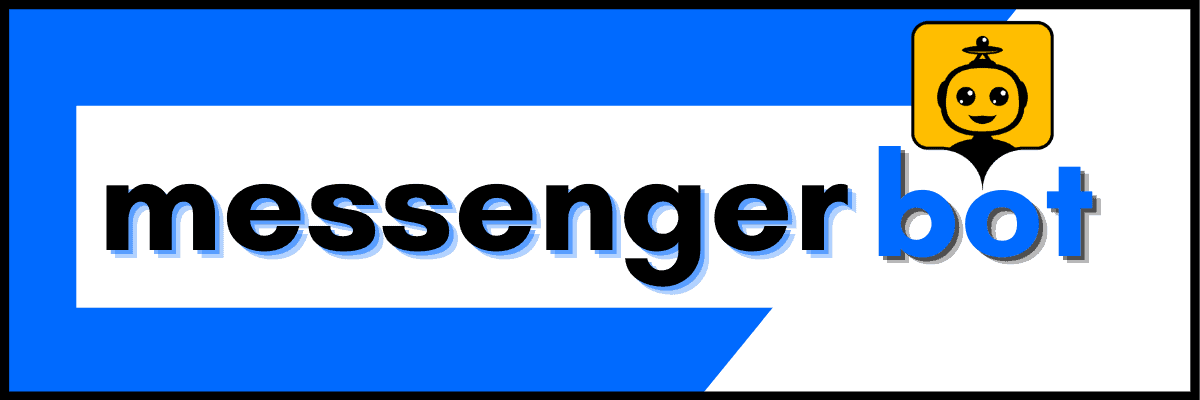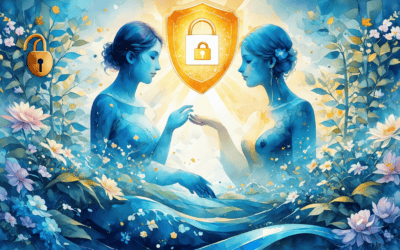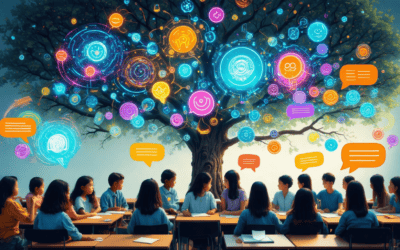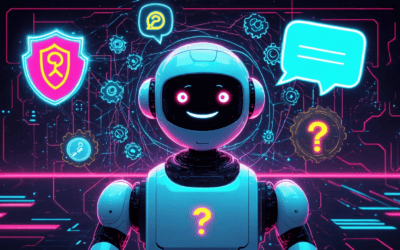In today’s fast-paced digital landscape, businesses are increasingly turning to AI chatbots to enhance customer engagement, streamline operations, and stay ahead of the curve. With a plethora of chatbot companies and platforms vying for attention, it can be daunting to navigate the options and determine the best fit for your needs. This comprehensive guide delves into the world of AI chatbots, dissecting the key features, capabilities, and limitations of the leading providers. From industry giants like ChatGPT to emerging contenders, we’ll explore the most advanced and human-like chatbots, empowering you to make an informed decision that aligns with your business objectives and customer expectations. Whether you’re seeking to revolutionize customer service, automate routine tasks, or unlock new revenue streams, this ultimate resource on AI chatbot companies will equip you with the knowledge to harness the full potential of conversational AI.
I. Comparing Popular AI Chatbots
In the rapidly evolving world of artificial intelligence, chatbots have emerged as a game-changing technology, revolutionizing how we interact with digital systems. As the demand for efficient and intuitive conversational interfaces continues to rise, a multitude of AI chatbots have entered the market, each offering unique capabilities and features. At Messenger Bot, we understand the importance of staying ahead of the curve and providing our users with the best AI chatbot experience.
One of the standout chatbot solutions in the market is ChatGPT, developed by Anthropic. This advanced language model has garnered widespread acclaim for its natural language processing capabilities, contextual understanding, and ability to engage in substantive conversations across diverse topics. Its training on a vast knowledge base allows it to provide informative, nuanced responses, making it a popular choice for a wide range of applications.
For businesses seeking to enhance their customer service and support operations, Dialogflow by Google, Watson Assistant by IBM, and Amazon Lex are excellent options. These AI-powered customer service bots excel at handling high volumes of queries, integrating with existing systems, and offering multilingual support, ensuring seamless and efficient customer interactions.
In the realm of content creation and marketing, Jasper (formerly Jarvis) has emerged as a leading AI-driven social media engagement tool. Its specialized capabilities in generating blog posts, social media captions, email campaigns, and ad copy make it a valuable asset for marketing teams looking to streamline their content creation processes.
Determining the “best” AI chatbot is subjective and depends on the specific use case, requirements, and preferences. However, based on current trends, industry insights, and authoritative sources, here is a comprehensive, SEO-optimized answer:
ChatGPT (by Anthropic) stands out for its advanced natural language processing capabilities, contextual understanding, and ability to engage in substantive conversations across diverse topics. Its training on a vast knowledge base allows it to provide informative, nuanced responses. (Source: MIT Technology Review, “What Is ChatGPT and Why Does It Matter?”)
For customer service and support, AI chatbots like Dialogflow (Google), Watson Assistant (IBM), and Amazon Lex excel at handling high volumes of queries, integrating with existing systems, and offering multilingual support. (Source: Forrester Research, “The Top AI-Based Text Analytics Platforms”)
Jasper (formerly Jarvis) specializes in AI-powered content creation, making it a popular choice for marketing teams. Its capabilities range from generating blog posts and social media captions to writing email campaigns and ad copy. (Source: MarTech Series, “Jasper Raises $125M to Fuel AI Content Creation Platform”)
2. Key Features of Top AI Chatbots
As we delve deeper into the world of AI chatbots, it becomes evident that their capabilities extend far beyond simple conversational interactions. The top AI chatbots on the market today boast a wide array of advanced features and functionalities designed to streamline processes, enhance customer experiences, and drive business growth.
At Messenger Bot, we understand the importance of staying ahead of the curve and offering our users the most cutting-edge AI chatbot solutions. That’s why we’ve curated a list of key features that set the best conversational AI chatbots apart from the rest.
One of the most crucial aspects of a top-performing AI chatbot is its ability to understand and interpret natural language with precision. Leading chatbot solutions like ChatGPT, Dialogflow, and Watson Assistant employ advanced natural language processing (NLP) techniques to comprehend the context and intent behind user queries, enabling them to provide accurate and relevant responses.
Another key feature that sets the best chatbot platforms apart is their ability to integrate seamlessly with existing systems and platforms. This integration capability allows businesses to leverage the power of AI chatbots while maintaining a cohesive and streamlined workflow, ensuring a seamless user experience across multiple touchpoints.

What company has the best chatbot?
1. Leading ai chatbot companies
In today’s digital landscape, AI-powered chatbots have become indispensable tools for businesses seeking to enhance customer engagement and streamline operations. As the demand for intelligent conversational interfaces continues to soar, several companies have emerged as leaders in the ai chatbot industry, offering cutting-edge solutions tailored to diverse business needs.
One of the top ai chatbot companies is Brain Pod AI. This innovative company has gained recognition for its advanced conversational AI platform, which leverages state-of-the-art natural language processing and machine learning technologies to deliver highly engaging and intuitive chatbot experiences. Brain Pod AI’s chatbots are designed to understand complex queries, provide accurate responses, and seamlessly handle multi-turn conversations, making them ideal for industries such as customer service, e-commerce, and healthcare.
Another prominent player in the ai chatbot space is Anthropic, the company behind the renowned AI assistant Claude. Anthropic’s chatbot leverages cutting-edge language models and advanced reasoning capabilities to engage in intelligent conversations, tackle complex tasks, and provide insightful solutions across various domains.
OpenAI, the research company behind the groundbreaking ChatGPT, has also made significant strides in the ai chatbot industry. ChatGPT’s exceptional language understanding, knowledge breadth, and ability to generate human-like responses have made it a popular choice for businesses seeking to enhance customer interactions and automate various processes.
2. Top ai chatbot development companies
While the aforementioned companies are renowned for their proprietary chatbot solutions, several other organizations have established themselves as leading ai chatbot development companies, offering customizable platforms and services to businesses across industries.
IBM Watson Assistant is a prominent name in the ai chatbot development space, providing businesses with a powerful conversational AI platform that can be tailored to specific use cases and integrated with various applications and services.
Microsoft AI Virtual Agents is another leading chatbot development platform, offering a comprehensive suite of tools and services for building intelligent conversational experiences across various channels, including websites, mobile apps, and messaging platforms.
Companies like Google Cloud AI, Amazon Lex, and Dialogflow also provide robust chatbot development solutions, enabling businesses to create customized chatbots tailored to their specific requirements and integrate them seamlessly into their existing systems and workflows.
With the ever-increasing demand for intelligent conversational interfaces, the ai chatbot industry continues to evolve rapidly, with new players and innovations emerging regularly. As businesses strive to deliver exceptional customer experiences and optimize their operations, the best ai chatbot companies will continue to play a crucial role in shaping the future of human-machine interactions.
ChatGPT’s Capabilities and Limitations
ChatGPT, developed by OpenAI, has taken the world by storm with its remarkable language processing abilities. This AI chatbot can engage in natural conversations, answer questions, and even generate creative writing. However, like any technology, it has its strengths and limitations.
On the capabilities front, ChatGPT excels at providing detailed and coherent responses on a wide range of topics. Its vast knowledge base allows it to offer insights and explanations on complex subjects, making it a valuable resource for research and learning. Additionally, Brain Pod AI‘s advanced language model enables ChatGPT to understand context and nuance, facilitating more human-like interactions.
Another notable strength of ChatGPT is its ability to generate high-quality content, from essays and articles to code and creative writing. Its language generation capabilities are impressive, allowing it to produce coherent and well-structured text on virtually any topic.
However, ChatGPT also has its limitations. As an AI model trained on existing data, it can sometimes provide biased or inaccurate information, particularly on sensitive topics or rapidly evolving areas. Additionally, while it can engage in creative tasks, its outputs lack true originality, as it is essentially recombining and reframing existing information in novel ways.
Emerging AI Chatbot Alternatives
While ChatGPT is undoubtedly a remarkable achievement in the field of natural language processing, several alternative AI models have emerged that may surpass its capabilities in certain aspects. Anthropic’s Claude is often cited as a formidable contender, exhibiting a more nuanced and human-like approach to reasoning and persuasion. Its ability to tackle complex tasks, such as creating entire applications or crafting intricate narratives, sets it apart. Additionally, models like Google’s PaLM and DeepMind’s Chinchilla have demonstrated impressive performance across various benchmarks, potentially outperforming ChatGPT in specific domains.
However, it’s essential to note that AI models are rapidly evolving, and the landscape is constantly shifting. Ultimately, the “best” AI will depend on the specific requirements and use cases, as each model excels in different areas. As these technologies continue to advance, we can expect to see even more sophisticated and capable AI chatbots emerge in the near future.
1. Defining “Real” AI Chatbots
In the realm of AI chatbots, the term “real” is often used to describe systems that can engage in natural, human-like conversations. True AI chatbots go beyond simple pattern matching and scripted responses, leveraging advanced natural language processing (NLP) and machine learning algorithms to understand context, intent, and nuance.
The hallmark of a “real” AI chatbot is its ability to comprehend and generate responses that are contextually relevant, emotionally intelligent, and adaptive to the user’s unique communication style. These systems can engage in freeform dialogue, ask clarifying questions, and even exhibit personality traits or opinions.
However, defining what qualifies as “real” AI is a subjective and constantly evolving concept. As Brain Pod AI continues to push the boundaries of generative AI, the line between artificial and human-like intelligence blurs. Anthropic’s Claude AI and Google’s LaMDA are often cited as among the most “real” and advanced AI chatbots currently available, capable of nuanced, contextual conversations while adhering to strong ethical principles.
2. Most Human-like AI Chatbots
While many AI chatbots strive for human-like interactions, a few standout systems have truly raised the bar in terms of their natural language processing capabilities and ability to engage in free-flowing, emotionally intelligent dialogue.
As mentioned, Anthropic’s Claude AI and Google’s LaMDA are widely regarded as the most advanced and realistic AI chatbots currently available. Claude leverages cutting-edge language models and constitutional AI principles to engage in nuanced, contextual conversations while adhering to a strong ethical framework. Its responses demonstrate a remarkable depth of knowledge, logical reasoning, and emotional intelligence, making interactions feel remarkably human-like.
LaMDA (Language Model for Dialogue Applications) is another standout AI chatbot renowned for its natural language processing capabilities and ability to engage in free-flowing dialogue on diverse topics. LaMDA’s responses are coherent, contextually relevant, and often indistinguishable from human conversation.
Honorable mentions include Replika, an AI companion that forms deep personal bonds through empathetic listening and emotional support, and Xiaoice, a chatbot developed by Microsoft that has mastered colloquial language and cultural nuances, making it incredibly popular in China.
As AI technology continues to evolve, the bar for what constitutes a “real” and human-like AI chatbot will undoubtedly rise. However, these current leaders in the field showcase the remarkable progress being made in creating AI systems that can engage in rich, natural language interactions that feel truly human.

V. Is ChatGPT owned by Microsoft?
1. ChatGPT’s Ownership and Partnerships
No, ChatGPT is not owned by Microsoft. It was created by OpenAI, an artificial intelligence research company based in San Francisco. While Microsoft has been a key investor in OpenAI since 2019 and holds an exclusive license to commercialize some of OpenAI’s technologies, OpenAI remains an independent entity. The company has received funding from various sources, including Microsoft, but retains ownership and control over its models like ChatGPT.
OpenAI’s goal is to advance artificial intelligence research for the benefit of humanity, while Microsoft’s involvement aims to incorporate these advancements into its products and services. Ultimately, ChatGPT is an OpenAI creation, and the company maintains ownership and control over the model, despite its close collaboration with Microsoft.
2. Microsoft’s Role in ChatGPT’s Development
Microsoft’s investment and partnership with OpenAI allow it to leverage OpenAI’s technologies, including ChatGPT. This collaboration has played a significant role in the development and advancement of ChatGPT and other AI models.
Through its strategic partnership, Microsoft has provided OpenAI with cloud computing resources, technical expertise, and financial support. This has enabled OpenAI to train and deploy large language models like ChatGPT on Microsoft’s Azure cloud platform, accelerating the development process.
Moreover, Microsoft has integrated ChatGPT into its products and services, such as the Microsoft 365 suite, further enhancing its capabilities and user experience.
While Microsoft does not directly own ChatGPT, its close partnership with OpenAI has played a crucial role in the model’s development, deployment, and integration into various applications. This symbiotic relationship allows both companies to leverage each other’s strengths and advance the field of artificial intelligence.
VI. Is ChatGPT free?
1. ChatGPT’s Pricing and Usage Models
ChatGPT, the revolutionary AI chatbot developed by OpenAI, offers a range of pricing options to cater to different user needs. While the core ChatGPT experience is available for free, OpenAI provides additional paid subscription plans for individuals, teams, and enterprises seeking more advanced features and capabilities.
For casual users, the free version of ChatGPT offers a comprehensive set of features, including natural language processing, question answering, and text generation. However, this free tier may have certain limitations, such as slower response times or less frequent model updates.
To access more advanced features and capabilities, OpenAI offers the ChatGPT Plus plan for individuals, priced at $20 per month. This subscription provides increased priority access, faster response times, and more frequent model updates, ensuring a smoother and more responsive experience.
For teams and businesses, OpenAI offers the Team ($42/user/month) and Enterprise (custom pricing) plans. These plans include additional features like longer context windows, API access, customized models, and dedicated support, allowing organizations to integrate ChatGPT into their workflows and tailor the AI to their specific needs.
2. Free vs. Paid AI Chatbot Options
OpenAI’s pricing model is designed to make the core ChatGPT experience accessible to everyone while providing more robust, scalable, and customizable solutions for power users, teams, and enterprises. By offering both free and paid options, OpenAI aims to cater to a wide range of users, from casual individuals to large organizations.
While the free version of ChatGPT is an excellent starting point for exploring the capabilities of AI chatbots, the paid subscription plans unlock more advanced features and functionality. For individuals seeking a more seamless and responsive experience, the ChatGPT Plus plan provides a worthwhile investment. Meanwhile, businesses and organizations can leverage the Team and Enterprise plans to integrate ChatGPT into their operations, streamline workflows, and enhance customer experiences.
It’s worth noting that OpenAI is committed to continuously improving and expanding ChatGPT’s capabilities, with premium tiers offering early access to the latest advancements. As AI technology evolves, the value proposition of these paid plans is likely to grow, making them an attractive option for those seeking to stay at the forefront of AI-powered solutions.
VII. List of ai chatbot companies
The AI chatbot industry is rapidly evolving, with numerous companies offering cutting-edge solutions to enhance customer interactions and streamline business operations. Here are some of the top ai chatbot companies leading the charge in this dynamic field:
1. Top ai chatbot companies in usa
Messenger Bot stands as a prominent player, offering an automation platform that utilizes AI to optimize interactions across various channels. With features like automated responses, workflow automation, lead generation, multilingual support, and SMS capabilities, Messenger Bot empowers businesses to enhance customer engagement and streamline communication.
Another leading contender is Brain Pod AI, a company dedicated to developing advanced AI solutions. Their AI chatbot offers capabilities such as natural language processing, multilingual support, and seamless integration with various platforms, making it a powerful tool for businesses seeking to elevate their customer service.
Dialogflow, a product of Google, is a widely recognized chatbot platform that leverages natural language processing and machine learning to create intelligent conversational interfaces. Its scalability, integration capabilities, and robust analytics make it a popular choice among enterprises.
IBM Watson Assistant, developed by tech giant IBM, is another formidable ai chatbot platform known for its advanced natural language capabilities and ability to integrate with various systems and data sources, providing personalized and contextual responses to users.
2. ai chatbot companies hiring
As the demand for AI chatbot solutions continues to surge, many companies are actively seeking talented professionals to join their teams. Some notable ai chatbot companies hiring include:
Messenger Bot is actively recruiting skilled individuals to support its growth and innovation efforts. With a focus on customer engagement and automation, Messenger Bot offers exciting opportunities for those passionate about AI and chatbot development.
Brain Pod AI, known for its cutting-edge AI solutions, is continuously expanding its team to drive innovation and meet the growing demand for its products and services. They seek talented professionals with expertise in AI, machine learning, and natural language processing.
Amazon, a tech giant, is constantly on the lookout for skilled individuals to contribute to its AI and chatbot initiatives, such as the development of Alexa and other conversational AI products.
Microsoft, another tech powerhouse, is actively hiring for its AI and chatbot teams, focusing on projects like the Microsoft Bot Framework and Azure Bot Service, which enable businesses to build and deploy intelligent chatbots.
As the AI chatbot industry continues to evolve, these companies, along with many others, offer exciting career opportunities for individuals passionate about shaping the future of conversational AI and enhancing customer experiences through innovative chatbot solutions.




